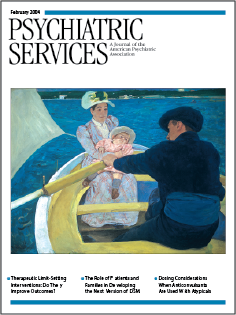Bridging Psychiatric Services Between Asia and America
In Reply: We are pleased that our Frontline Report on the Bridge Program has been well received by colleagues in both America and Asia. The concept of "bridge," developed by Dr. Henry Chung, a New York psychiatrist and a researcher and community leader in minority health care delivery, was an attempt to improve the connection between community needs and psychiatric services and to effect better communication and referral patterns between primary care providers and mental health professionals. We welcome Dr. Tsang's proposal to extend the bridge concept toward building more productive connections among similar or related service and research programs and across cultures.
Reflecting upon our experience and Dr. Tsang's comments, we feel that there are five essential components for developing culturally competent psychiatric services in ethnic minority communities.
First, antistigma community education must always be part of the long-term plan of a service program. Given the profound misconception and emotional resistance in the community toward mental disorders and psychiatric services, persistent efforts to provide basic mental health education with effective consumer involvement are key to improving access to community-based mental health services.
Second, training service providers—especially equipping primary care physicians, nurses, case managers, and culturally competent mental health professionals with updated knowledge and skills for delivering mental health care—is a crucial strategic step toward eventually closing the gap between the enormous mental health needs and limited service capacity in these communities (1).
Third, development of culturally competent instrumentation, such as the efforts led by Dr. Teng and her colleagues (2) and Dr. Mui (3) in geriatric psychiatry and Dr. Tsang in rehabilitation psychiatry, provides crucial tools for detecting clinical cases and assessing treatment outcomes. Despite the research efforts of cross-cultural psychiatrists over the past half century, much important work remains to be done in this field.
Fourth, developing and testing the effectiveness of treatment protocols and care delivery models that are adapted or created for ethnic minority populations is an inevitable step in the development of evidence-based psychiatry for these populations. Research that can improve our understanding of culturally relevant expectations, explanations, and service barriers, as well as effective treatment protocols, typically requires long-term collaborative efforts and funding.
Fifth, even more interdisciplinary collaboration is required to build much needed community-based systems of care (4) that ensure effective linkages among different care programs in order to systematically address the myriad health, economic, and educational needs typically found in ethnic minority populations. Until we can achieve the strategic goals of enhancing service integration, service linkage, and the continuum of care, equal access to appropriate care for all will remain an unfulfilled dream, and individuals suffering from mental illness, particularly immigrants and members of minority groups, will continue to be denied the opportunity to attain their full potential.
Achieving our goals requires interdisciplinary and international cooperation and collaboration, which combines the benefits of technology with the richness and wisdom of tradition, and a continued dedication to advocating for the mentally ill population and to ensuring adequate funding for this increasingly important work.
1. Chung H: The challenges of providing behavioral treatment to Asian Americans. Western Journal of Medicine 176:222–223, 2002Medline, Google Scholar
2. Teng EL, Hasegawa K, Homma A, et al: The Cognitive Abilities Screening Instrument (CASI): a practical test for cross-cultural epidemiological studies of dementia. International Psychogeriatrics 6:45–58, 1994Crossref, Medline, Google Scholar
3. Mui AC: Geriatric Depression Scale as a community screening instrument for elderly Chinese immigrants. International Psychogeriatrics 8:445–458, 1996Crossref, Medline, Google Scholar
4. Kiser LJ, Lefkovitz PM, Kennedy LL (eds): The Integrated Behavioral Health Continuum: Theory and Practice. Washington, DC, American Psychiatric Publishing, 2001Google Scholar



